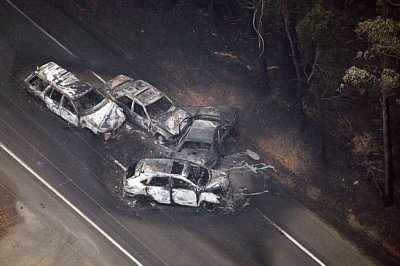Adding The Toll Of The Heat Wave
Posted by Big Gav in global warming, heat wave, melbourne, victoria
Gary at Public Opinion has a post on the toll in South Australia from the latest bout of hot weather - Heat Wave.
In Adelaide the plain trees are already shedding their leaves, the bodies of dead possums litter the parklands, and the death toll of human beings is around 75. As in Melbourne, there have been crippling blackouts due to the failure of the $780 million Basslink interconnector cable linking Victoria and Tasmania, which is unable to operate when temperatures in Launceston Tasmania pass 35C.
NEMMCO continues to talk in terms of the national electricity market having sufficient capacity to deliver reliable supply. Politicians explain the disconnect between assurance and reality by talking in terms of the heatwave being one-in-100-year event, rather than this being an indication of southern Australia's future. Yet there have been a series of rolling blackouts over the past years due to supply falling short of increasing demand --hence the frequent load shedding that causes the blackouts during a heatwave.
A warmed up world means hotter conditions in cities, towns and the regions since long hot, dry summers are becoming the norm. Shouldn't we see the blackouts as a timely warning about a rundown energy system with its old industrial technology utilizing fossil fuels? This is an electricity grid that has seen little new investment in the last decade.

The Age reports the temperature in Melbourne hit an all-time record on the weekend - City swelters, records tumble in heat - causing power outages.
Melbourne's all-time weather record has been broken and the city is sweltering under the twin effects of high temperatures and hot north-west winds. The city hit 46.4 degrees at 3.04pm - the hottest day since the Bureau of Meteorology started keeping records 150 years ago.
City dwellers had it pretty easy compared to people in country victoria, where the temperature got over 48 degrees and over 100 people lost their lives in bushfires - Australia's bushfire disaster: many good people lie dead in Victoria. Power outages in the country may last for days
AUSTRALIA has witnessed its greatest natural disaster. ... At 7.35am today the official death toll was 108, with at least 750 homes destroyed - 550 of those in Kinglake, north of Melbourne, and surrounding areas.
According to police figures, another 11 people were found dead at Kinglake West, north of Melbourne, taking that community's toll to 20, while another four bodies were found at Marysville taking that town's toll to eight.

The Age has a report on warnings that these events will get worse as global warming proceeds unchecked - It will only get worse as climate changes
AUSTRALIA faces "a very dangerous decade or decades" as climate change increases the intensity of fires and lengthens the bushfire season, scientists and environmentalists warn. Research by the Australian Bureau of Meteorology and the CSIRO has found that bushfire seasons will start earlier, end slightly later and become more intense in coming decades.
A climate study of south-east Australia by the agencies in 2007 found the number of days with "very high" or "extreme" fire danger ratings would increase significantly. The worst changes were predicted for northern NSW. By 2020, days of extreme fire danger are forecast to increase by 5 to 25 per cent if climate change is low and by 15 to 65 per cent if it is high.
An author of the report, Kevin Hennessy from the CSIRO, told the Herald yesterday: "There does seem to be a human element to bushfire risk. In terms of human contribution it is clear that most of the global warming since about 1950 is likely due to increases in greenhouse gases. Higher temperatures clearly increase the risk of bushfires."

The Age notes that the various social media channels are keeping up a running commentary on the fires - Social media rush as Victorian bushfires rage
As the worst bushfires in Australia's history raged across Victoria, Twitter, Flickr and Facebook lit up with condolences and horrific first-hand accounts, while many used innovative online mapping tools to assess the risk of the fires reaching their own homes.
Mainstream news outlets, battling to provide comprehensive coverage of the tragedy, have incorporated accounts published on the social networking sites extensively in their reports.
Using online social media to spread vital information and personal stories is becoming increasingly commonplace in times of crisis, but this may be the first time the social networking sites have been used extensively during an Australian disaster.
Google's engineers have created a map containing the latest up-to-date information about fire locations and their status, based on data provided by Victoria's Country Fire Authority (CFA).
The map, updated in real-time with information about the number, type and size of fires in a particular location, buckled as thousands of web users sought out updates. But the site appeared to be working as normal this morning.
Google created the map after the CFA's website struggled to cope with the surge in people looking for information about the fires.
"We hope that it's of some use to people who may be affected, to emergency services personnel, and that it takes some load off other websites which are being inundated," Google wrote in a blog post.
Aus-emaps.com created its own map of the fire locations - derived from data provided by Federal Government body Geoscience Australia through its Sentinel national bushfire monitoring system - before Google but also reported slowdowns due to high demand. And NASA has published satellite images showing the bushfires here.
On Twitter, "bushfires" is as of this morning the No.1 "trending topic" as users traded first-hand accounts, news, and information on how to donate and seek help. Prime Minister Kevin Rudd, through his Twitter account, has published messages telling his 7000 followers how to make cash and blood donations, find out more information on the fires and seek emergency Government assistance.






